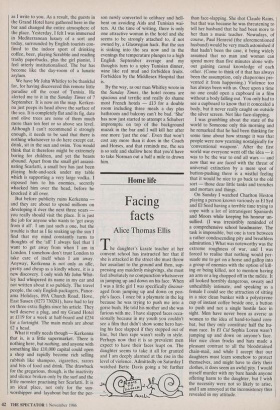Home life
Facing facts
Alice Thomas Ellis
The daughter's karate teacher at her convent school has instructed her that if she is attacked in the street she must throw her assailant to the ground and then, sup- pressing any maidenly misgivings, she must feel absolutely no compunction whatsoever in jumping up and down on his face. When I was a little girl I was specifically discour- aged from jumping up and down on peo- ple's faces. I once bit a playmate in the leg because he was trying to push me into a gorse bush. He told his mother and she was furious with me. I have slapped faces occa- sionally because in my youth you couldn't see a film that didn't show some hero hav- ing his face slapped if they stepped out of line, but then rape wasn't really in style. Perhaps now that it is so prevalent men expect to have their faces leapt on. The daughter seems to take it all for granted and I am deeply alarmed at the rise in the level of violence. Admittedly on Saturday I watched Bette Davis going a bit further than face-slapping. She shot Claude Rains, but that was because he was threatening to tell her husband that he had been more to her than a music teacher. Nowadays, of course, Paul Henreid (the aforementioned husband) would be very much astonished if that hadn't been the case, it being widely assumed that no man and woman can spend more than five minutes alone with- out gaining carnal knowledge of each other. (Come to think of it that has always been the assumption, only chaperones pre- vented it from happening.) Violence too has always been with us. Once upon a time no one could open a cupboard in a film without a body falling out. You only had to see a cupboard to know that it concealed a body, but it never really caught on outside the silver screen. Not like face-slapping.
I was grumbling about the state of the world to Someone only this morning and he remarked that he had been thinking for some time about how strange it was that people were now yearning nostalgically for `conventional weapons'. After the first world war everyone went off the idea — it was to be the war to end all wars — and now that we are faced with the threat of universal extinction by a mere spot of button-pushing there is a wistful feeling that it would be nice to go back to the old sort — those dear little tanks and trenches and mortars and things.
On Sunday I watched Charlton Heston playing a person known variously as El Syd and El Seed having a terrible time trying to cope with a lot of intransigent Spaniards and Moors while keeping his honour un- sullied. (1 was irresistibly reminded of a comprehensive school headmaster. The task is impossible, but one is torn between a rather condescending pity and breathless admiration.) What was noteworthy was the extreme roughness of war, and I was forced to realise that nothing would per- suade me to get on a horse and gallop into a group of enemies with the option of kill- ing or being killed, not to mention having an arm or a leg chopped off in the melee. It all looked horribly dangerous, sweaty and unhealthily intimate, and speaking as a female I could see the attraction of sitting in a nice clean bunker with a polystyrene cup of instant coffee beside one, a button to push and not a single hostile face in sight. Men have never been as averse as women to the idea of hand-to-hand com- bat, but they only constitute half the hu- man race. In El Cid Sophia Loren wasn't jumping up and down on anyone's face. Her nice clean frocks and hats made a pleasant contrast to all the bloodstained chain-mail, and while I accept that our daughters must learn somehow to protect themselves, and might have to dirty their clothes, it does seem an awful pity. I would myself murder with my bare hands anyone offering harm to the daughter, but I wish the necessity were not so likely to arise, and I am annoyed at the inconsistency thus revealed in my attitude.


















































 Previous page
Previous page